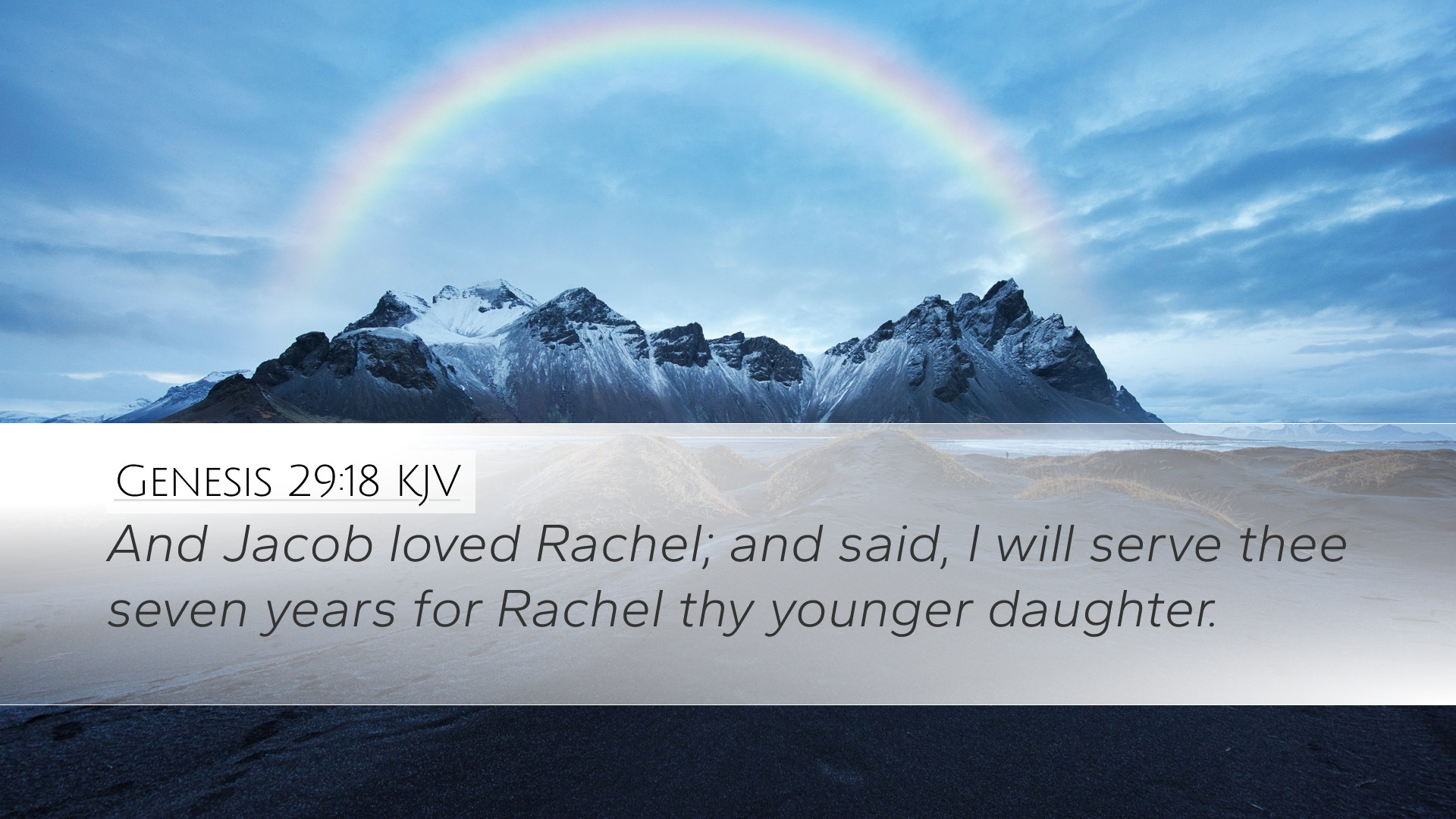Commentary on Genesis 29:18
"And Jacob loved Rachel; and said, I will serve thee seven years for Rachel thy younger daughter." (Genesis 29:18)
Introduction
The narrative surrounding Jacob's love for Rachel is one of deep emotional resonance and profound theological implications.
This passage encapsulates the themes of love, labor, and the intricate dynamics of human relationships as ordained by God.
Literary Context
This verse is set within the larger context of Jacob's journey and the unfolding of God's plan for the covenant family.
Jacob's arrival in Haran marks a crucial turning point in his life, moving from the home of his father Isaac to a new setting where he must navigate familial ties and fulfill divine promises.
Exegesis of Genesis 29:18
The verse reveals Jacob's immediate affection for Rachel, his cousin, which serves as a turning point in his narrative.
The profound nature of Jacob's love for Rachel can be understood through several key elements:
- Love and Devotion: Jacob's proclamation of love is not just a mere statement of affection; it is accompanied by a commitment to serve for seven years.
Albert Barnes highlights that this act of servitude is a testament to Jacob's willingness to endure hardship for the sake of love, illustrating the depth of his feelings.
- Cultural Context: Adam Clarke comments on the customs of the time, noting that it was typical for a man to work for his bride.
Jacob's determination to serve Rachel reflects the cultural expectations of his day and emphasizes the significance of betrothal.
- God’s Providence: The circumstances of Jacob's love for Rachel may also be seen within the framework of God’s providence.
Matthew Henry indicates that the Lord orchestrated these events, allowing Jacob to encounter Rachel and subsequently leading to the fulfillment of His promises to Abraham and Isaac through this union.
Theological Implications
The narrative exemplifies several theological themes which are pertinent to the understanding of God’s work in the lives of individuals:
- Union through Love: The relationship between Jacob and Rachel symbolizes the covenant love that God desires in human relationships.
Jacob's fervent love mirrors God's unconditional love for His people, serving as a metaphor for the depth of devotion expected in covenant relationships.
- Service as an Expression of Love: Jacob's willingness to labor for Rachel reflects the biblical theme that true love is intrinsically linked with sacrificial service.
This theme resonates with the New Testament understanding of love, where Jesus exemplifies ultimate love through His sacrificial act.
- The Challenge of Love: The narrative foreshadows forthcoming trials in Jacob's relationship, highlighting that love is often accompanied by challenges.
Pastors and theologians can glean insights into the struggles of maintaining relationships under pressure, as depicted through Jacob’s eventual conflicts with Laban.
Practical Applications
For pastors, students, and theologians, Genesis 29:18 presents several practical applications that remain relevant today:
- Commitment in Relationships:
Encourage individuals to reflect on the level of commitment in their personal relationships, using Jacob's dedication to Rachel as a model of steadfast love.
- Understanding God's Timing:
Emphasize the importance of patience and perseverance, both in the context of romantic relationships and in the broader scope of God’s timing in one’s life.
- Valuing Service:
Promote the idea that love often requires service; believers should consider ways to serve others in a spirit of love, whether in familial, ecclesiastical, or community settings.
Conclusion
Genesis 29:18 serves as a profound testament to the dynamics of love, labor, and divine providence.
As Jacob’s journey unfolds, his love for Rachel not only shapes his destiny but also lays the groundwork for generations to come.
By examining this verse through the lens of public domain commentaries, we uncover rich theological insights that speak to the heart of human relationships and God's overarching narrative for His creation.


